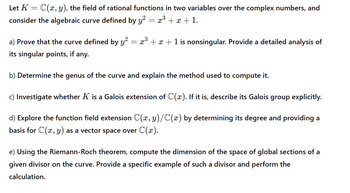
Algebra & Trigonometry with Analytic Geometry
13th Edition
ISBN: 9781133382119
Author: Swokowski
Publisher: Cengage
expand_more
expand_more
format_list_bulleted
Question
Need detailed solutions for all parts asap

Transcribed Image Text:Let K = C(x, y), the field of rational functions in two variables over the complex numbers, and
consider the algebraic curve defined by y² = x³ + x + 1.
a) Prove that the curve defined by y² = x³ + x + 1 is nonsingular. Provide a detailed analysis of
its singular points, if any.
b) Determine the genus of the curve and explain the method used to compute it.
c) Investigate whether K is a Galois extension of C(x). If it is, describe its Galois group explicitly.
d) Explore the function field extension C(x, y)/C(x) by determining its degree and providing a
basis for C(x, y) as a vector space over C(x).
e) Using the Riemann-Roch theorem, compute the dimension of the space of global sections of a
given divisor on the curve. Provide a specific example of such a divisor and perform the
calculation.
Expert Solution
This question has been solved!
Explore an expertly crafted, step-by-step solution for a thorough understanding of key concepts.
Step by stepSolved in 2 steps with 5 images

Knowledge Booster
Recommended textbooks for you
- Algebra & Trigonometry with Analytic GeometryAlgebraISBN:9781133382119Author:SwokowskiPublisher:Cengage
 College Algebra (MindTap Course List)AlgebraISBN:9781305652231Author:R. David Gustafson, Jeff HughesPublisher:Cengage Learning
College Algebra (MindTap Course List)AlgebraISBN:9781305652231Author:R. David Gustafson, Jeff HughesPublisher:Cengage Learning

Algebra & Trigonometry with Analytic Geometry
Algebra
ISBN:9781133382119
Author:Swokowski
Publisher:Cengage

College Algebra (MindTap Course List)
Algebra
ISBN:9781305652231
Author:R. David Gustafson, Jeff Hughes
Publisher:Cengage Learning